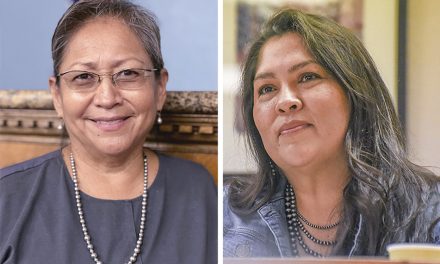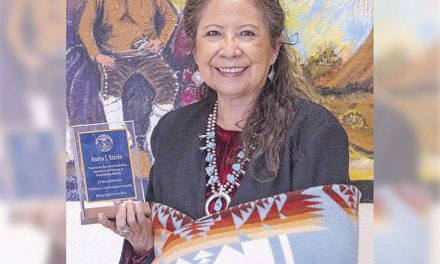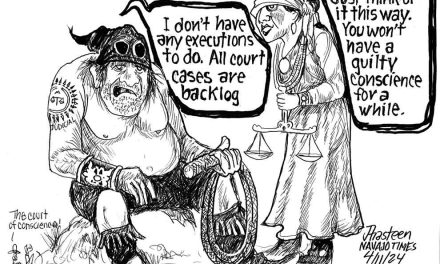
Delegates raise Hardship Assistance to $90 million
WINDOW ROCK
In a grueling 20-hour Naabik’iyati’ Committee session last Thursday and Friday, delegates debated over stalled COVID-19 response projects with unspent Coronavirus Aid, Relief and Economic Security Act funds and how much of that money should be reverted to the Hardship Assistance program for direct payments to the people.
The meeting took place in line with a directive in prior Council resolutions (CJY-67-20 and CS-73-20) that the progress of all CARES Act projects was to be reviewed by the Budget and Finance and Naabik’iyati’ committees in October to identify projects that could not be completed by Dec. 30 where the funding would be reallocated to Hardship Assistance.
On Oct. 28, the BFC passed a recommendation for $89 million of unspent and unencumbered monies be reverted to the Hardship Assistance fund, including $18.6 million (hazard pay), $9 million (personal protective equipment), $37.5 million (business and artisan grant relief), $829,000 (Parks and Recreation vendors), $3.2 million (Judicial Branch), $15 million (Department of Health), and $5 million (facility safety assurance).
“We, as Budget and Finance Committee, did our task, based on reports from directors overseeing CARES fund expenditures,” said BFC Chairman Jamie Henio. As of Oct. 28, $185 million of the $714 million in Navajo CARES Act funds had been spent.
Of this, $91 million is encumbered (contracts in place), leaving a budget balance of $418 million in unspent, appropriated monies (that includes the existing $49 million for Hardship Assistance and $90 million for chapters), as reported by the controller’s office.
The purpose of Hardship Assistance is to provide emergency financial assistance to tribal members who have experienced loss of income and/or increased expenses due to the COVID-19 pandemic and public health emergency orders. In order to accommodate the maximum $1,500 payments to adults and $500 to minors for over 327,000 enrolled Navajo, an estimated $400 million would be needed.
‘People are frustrated’
The Naabik’iyati’ Committee deliberated over the BFC recommendations in considering No. 261-20, sponsored by Delegate Carl Slater, that contains the framework to return the unspent CARES monies to the Hardship Assistance fund. However, the BFC recommendation was ultimately stricken in its entirety from the legislation because select division directors, including DOH Director Jill Jim and Department of Economic Development Director JT Willie, backed by President Jonathan Nez, made the case that they needed more time to spend the funds allocated to their programs.
As a public service, the Navajo Times is making all coverage of the coronavirus pandemic fully available on its website. Please support the Times by subscribing.
How to protect yourself and others.
Why masks work. Which masks are best.
Resources for coronavirus assistance
Specifically, Jim told delegates that while some DOH contracts were not yet officially obligated per the controller’s CARES expenditure report, there were still several important contracts in the approval pipeline.
Willie said that DED wished to extend the application deadline for business and artisan grant relief into November to accommodate more applicants and distribute more funds. Delegate Eugenia Charles-Newton and others expressed frustration that division directors had plenty of time to spend the money and knew the deadline to do so was the end of October.
“We talk about holding our directors accountable and yet our people are seeing that we’re just making excuses,” said Charles-Newton. “Somebody is asleep at the wheel and now we’re here saying we need to give them more time. This money has been here for months and they’re still sitting on it.”
Delegate Herman Daniels complained that some delegates were being pressured to support putting money back into the Hardship Assistance fund to “bail out” other delegates. In the same breath he said that there were over a hundred people at the Monument Valley Welcome Center who waited in line for the paper Hardship applications earlier in the week. “We need to be very careful – the people are very frustrated,” said Daniels.
Charles-Newton reminded delegates that it was Controller Pearline Kirk who had recommended on multiple occasions distributing Hardship Assistance to the people as the most efficient way to get the CARES monies spent before Dec. 30 so that it does not revert back to the federal government.
“We have the experts saying now the time is revert because these projects can’t get done,” said Charles-Newton. Taking things a step further, an amendment put forth by Slater proposed reallocating $146 million in unspent CARES monies to the Hardship Assistance fund from water, power line, and broadband projects, care packages, health care facilities, and chapters. However, that also failed as many delegates lost the political will to make the hard cuts while some projects and programs could still be in the works.
“It just seems that we’re ignoring all of the conversations we’ve had previously and forgetting what’s written in legislations we all voted on,” said Slater. “We seem to be talking out of both sides of our mouth.
“We say we should be supporting the people and this broad relief,” he said, “but ‘don’t touch this, don’t touch that.’ I hope our love for our people is greater than our love for those within the government.”
‘Pet projects’
In yet another diversion from the task at hand, some delegates, including Edmund Yazzie and Jamie Henio, introduced the possibility of repurposing unspent funds for projects in their own districts instead of reverting the money to Hardship Assistance, which yielded more frustration among other delegates.
“Why are we debating this legislation?” ask Charles-Newton. “We’re presenting new projects and hearing new ideas when we’re in the eleventh hour.” With only 45 business days until the CARES Act expenditure deadline of Dec. 30, entertaining the idea of approving new projects just is not feasible, she indicated.
“It’s seems like people are working and conspiring to get their pet projects funded when we need to offer the most equitable relief to our people,” said Slater. “I really resent how certain delegates are saying their communities are more deserving for x, y or z. All of our people are deserving.”
Chief Legislative Counsel Dana Bobroff explained that reallocating monies to different expenditures such as infrastructure projects at this point would require separate legislation that would have to go through the regular process. “There does seem to be some confusion on the purpose of this legislation,” Bobroff said, referring to No. 261-20 and the original intent of the Naabik’iyati’ meeting. “This legislation has a very definite, limited purpose. That is to reallocate Navajo CARES funds to the Hardship Assistance expenditure plan.”
Slater offered that when delegates demonstrate a lack of knowledge of legislation they’ve voted on in the past, it tarnishes the reputation of the entire Council. “It’s embarrassing,” he said.
An exasperated Delegate Eugene Tso implored delegates to remember that the CARES Act money was meant to provide emergency assistance to the people, not for long-term infrastructure projects. “The CARES money was given to us to distribute to the people,” said Tso. “That’s all we had to do. Let the people use it! That’s what it’s for!”
Charles-Newton said that anyone who is paying attention knows that the Navajo people need hardship assistance. “People are seeing and hearing right now as to whether delegates are for the hardship or against it,” she said. “As delegates we always say, ‘We’re here for the people.’
“As elected officials, are we really asking them what they want?” she said. “You go to the local chapter house and see those lines for the hardship applications – that’s what our people want.”
Henio said that regardless of what his colleagues say, he will continue to advocate for his chapters. “These are my communities,” he said. “These are projects that will benefit the people out here.”
Delegate Edmund Yazzie agreed. “This is Naabik’iyati’,” said Yazzie. “We can talk about anything that is on our mind. That’s the way it is.”
Hardship pot upped to $90 million
Slater said delegates and the executive branch need to take responsibility for their actions. “At this point I think what we need to do is balance the overwhelming feedback we have received from the public in pursuing the hardship program over other items,” said Slater. “The vast majority of our citizens are seeking this assistance and have articulated why they need it. We have the opportunity to provide it.”
Ultimately, the Naabik’iyati’ Committee voted (21-0) to add $41 million to the existing $49 million Hardship Assistance pot, which now totals $90 million. This is $310 millions short of what is needed to fund hardship assistance for all Navajos.
The $41 million that was approved in an amendment introduced by Delegate Otto Tso came out of water projects that Water Resources Director Jason John testified would not be able to be completed by Dec. 30.
John was the only executive branch director who provided a clear recommendation as to which funds could be reverted and why. Nevertheless, several delegates were disappointed that more money didn’t get reallocated to the Hardship Assistance fund.
“Our people’s actions are speaking louder than their words,” said Charles-Newton. “They’re saying, ‘We need help,’ and here we are going in circles. It’s sad they’re playing politics in the midst of a pandemic when people are dying and losing loved ones. When we say we’re helping the people – are we helping the people?”
However, as a fail-safe measure, the Naabik’iyati’ Committee also approved an amendment put forth by Delegate Kee Allen Begay that any unobligated CARES funds not spent by Nov. 20 and any funds still encumbered as of Dec. 15 will automatically reallocated to Hardship Assistance fund. Henio said the extension will give division directors an opportunity to “show their leadership” in coming weeks. “Chances are the money won’t be spent and most of the money will be going back to the hardship relief fund from these monies that have been sitting idle,” said Henio.
Slater said it can’t be underscored enough that a failure to implement a plan to expedite procurement and payment processing has “imperiled” all of the $714 million CARES Act dollars since day one. “If we had taken care of this back in May or June, we would have had a playbook for all the programs instead of just piecing things together with bailing wire and gum,” said Slater. “It seems that every time we get to these hard choices, the president just sweeps in at the end and requests that we not do anything, and just bail out, bail out, and bail out…”







 Highway 264,
Highway 264, I-40, WB @ Winslow
I-40, WB @ Winslow